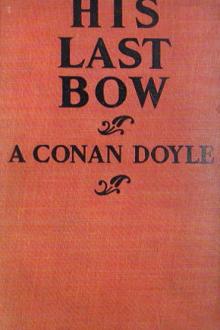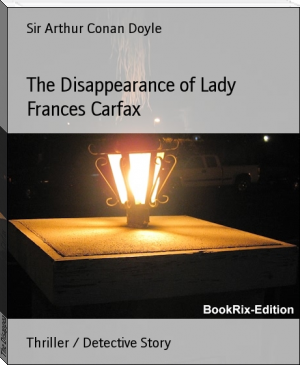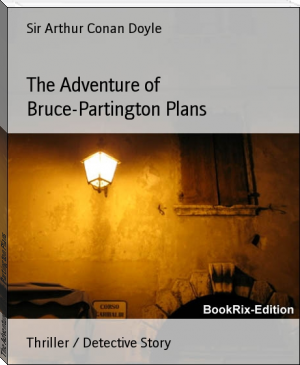His Last Bow, Arthur Conan Doyle [love books to read TXT] 📗

- Author: Arthur Conan Doyle
- Performer: -
Book online «His Last Bow, Arthur Conan Doyle [love books to read TXT] 📗». Author Arthur Conan Doyle
middle age. Her dark, clear-cut face was handsome, even in
death, but there still lingered upon it something of that
convulsion of horror which had been her last human emotion. From
her bedroom we descended to the sitting-room, where this strange
tragedy had actually occurred. The charred ashes of the
overnight fire lay in the grate. On the table were the four
guttered and burned-out candles, with the cards scattered over
its surface. The chairs had been moved back against the walls,
but all else was as it had been the night before. Holmes paced
with light, swift steps about the room; he sat in the various
chairs, drawing them up and reconstructing their positions. He
tested how much of the garden was visible; he examined the floor,
the ceiling, and the fireplace; but never once did I see that
sudden brightening of his eyes and tightening of his lips which
would have told me that he saw some gleam of light in this utter
darkness.
“Why a fire?” he asked once. “Had they always a fire in this
small room on a spring evening?”
Mortimer Tregennis explained that the night was cold and damp.
For that reason, after his arrival, the fire was lit. “What are
you going to do now, Mr. Holmes?” he asked.
My friend smiled and laid his hand upon my arm. “I think,
Watson, that I shall resume that course of tobacco-poisoning
which you have so often and so justly condemned,” said he. “With
your permission, gentlemen, we will now return to our cottage,
for I am not aware that any new factor is likely to come to our
notice here. I will turn the facts over in my mid, Mr,
Tregennis, and should anything occur to me I will certainly
ommunicate with you and the vicar. In the meantime I wish you
both good-morning.”
It was not until long after we were back in Poldhu Cottage that
Holmes broke his complete and absorbed silence. He sat coiled in
his armchair, his haggard and ascetic face hardly visible amid
the blue swirl of his tobacco smoke, his black brows drawn down,
his forehead contracted, his eyes vacant and far away. Finally
he laid down his pipe and sprang to his feet.
“It won’t do, Watson!” said he with a laugh. “Let us walk along
the cliffs together and search for flint arrows. We are more
likely to find them than clues to this problem. To let the brain
work without sufficient material is like racing an engine. It
racks itself to pieces. The sea air, sunshine, and patience,
Watson—all else will come.
“Now, let us calmly define our position, Watson,” he continued as
we skirted the cliffs together. “Let us get a firm grip of the
very little which we DO know, so that when fresh facts arise we
may be ready to fit them into their places. I take it, in the
first place, that neither of us is prepared to admit diabolical
intrusions into the affairs of men. Let us begin by ruling that
entirely out of our minds. Very good. There remain three
persons who have been grievously stricken by some conscious or
unconscious human agency. That is firm ground. Now, when did
this occur? Evidently, assuming his narrative to be true, it was
immediately after Mr. Mortimer Tregennis had left the room. That
is a very important point. The presumption is that it was within
a few minutes afterwards. The cards still lay upon the table.
It was already past their usual hour for bed. Yet they had not
changed their position or pushed back their chairs. I repeat,
then, that the occurrence was immediately after his departure,
and not later than eleven o’clock last night.
“Our next obvious step is to check, so far as we can, the
movements of Mortimer Tregennis after he left the room. In this
there is no difficulty, and they seem to be above suspicion.
Knowing my methods as you do, you were, of course, conscious of
the somewhat clumsy water-pot expedient by which I obtained a
clearer impress of his foot than might otherwise have been
possible. The wet, sandy path took it admirably. Last night was
also wet, you will remember, and it was not difficult—having
obtained a sample print—to pick out his track among others and
to follow his movements. He appears to have walked away swiftly
in the direction of the vicarage.
“If, then, Mortimer Tregennis disappeared from the scene, and yet
some outside person affected the card-players, how can we
reconstruct that person, and how was such an impression of horror
conveyed? Mrs. Porter may be eliminated. She is evidently
harmless. Is there any evidence that someone crept up to the
garden window and in some manner produced so terrific an effect
that he drove those who saw it out of their senses? The only
suggestion in this direction comes from Mortimer Tregennis
himself, who says that his brother spoke about some movement in
the garden. That is certainly remarkable, as the night was
rainy, cloudy, and dark. Anyone who had the design to alarm
these people would be compelled to place his very face against
the glass before he could be seen. There is a three-foot flower-border outside this window, but no indication of a footmark. It
is difficult to imagine, then, how an outsider could have made so
terrible an impression upon the company, nor have we found any
possible motive for so strange and elaborate an attempt. You
perceive our difficulties, Watson?”
“They are only too clear,” I answered with conviction.
“And yet, with a little more material, we may prove that they are
not insurmountable,” said Holmes. “I fancy that among your
extensive archives, Watson, you may find some which were nearly
as obscure. Meanwhile, we shall put the case aside until more
accurate data are available, and devote the rest of our morning
to the pursuit of neolithic man.”
I may have commented upon my friend’s power of mental detachment,
but never have I wondered at it more than upon that spring
morning in Cornwall when for two hours he discoursed upon celts,
arrowheads, and shards, as lightly as if no sinister mystery were
waiting for his solution. It was not until we had returned in
the afternoon to our cottage that we found a visitor awaiting us,
who soon brought our minds back to the matter in hand. Neither
of us needed to be told who that visitor was. The huge body, the
craggy and deeply seamed face with the fierce eyes and hawk-like
nose, the grizzled hair which nearly brushed our cottage ceiling,
the beard—golden at the fringes and white near the lips, save
for the nicotine stain from his perpetual cigar—all these were
as well known in London as in Africa, and could only be
associated with the tremendous personality of Dr. Leon Sterndale,
the great lion-hunter and explorer.
We had heard of his presence in the district and had once or
twice caught sight of his tall figure upon the moorland paths.
He made no advances to us, however, nor would we have dreamed of
doing so to him, as it was well known that it was his love of
seclusion which caused him to spend the greater part of the
intervals between his journeys in a small bungalow buried in the
lonely wood of Beauchamp Arriance. Here, amid his books and his
maps, he lived an absolutely lonely life, attending to his own
simple wants and paying little apparent heed to the affairs of
his neighbours. It was a surprise to me, therefore, to hear him
asking Holmes in an eager voice whether he had made any advance
in his reconstruction of this mysterious episode. “The county
police are utterly at fault,” said he, “but perhaps your wider
experience has suggested some conceivable explanation. My only
claim to being taken into your confidence is that during my many
residences here I have come to know this family of Tregennis very
well—indeed, upon my Cornish mother’s side I could call them
cousins—and their strange fate has naturally been a great shock
to me. I may tell you that I had got as far as Plymouth upon my
way to Africa, but the news reached me this morning, and I came
straight back again to help in the inquiry.”
Holmes raised his eyebrows.
“Did you lose your boat through it?”
“I will take the next.”
“Dear me! that is friendship indeed.”
“I tell you they were relatives.”
“Quite so—cousins of your mother. Was your baggage aboard the
ship?”
“Some of it, but the main part at the hotel.”
“I see. But surely this event could not have found its way into
the Plymouth morning papers.”
“No, sir; I had a telegram.”
“Might I ask from whom?”
A shadow passed over the gaunt face of the explorer.
“You are very inquisitive, Mr. Holmes.”
“It is my business.”
With an effort Dr. Sterndale recovered his ruffled composure.
“I have no objection to telling you,” he said. “It was Mr.
Roundhay, the vicar, who sent me the telegram which recalled me.”
“Thank you,” said Holmes. “I may say in answer to your original
question that I have not cleared my mind entirely on the subject
of this case, but that I have every hope of reaching some
conclusion. It would be premature to say more.”
“Perhaps you would not mind telling me if your suspicions point
in any particular direction?”
“No, I can hardly answer that.”
“Then I have wasted my time and need not prolong my visit.” The
famous doctor strode out of our cottage in considerable ill-humour, and within five minutes Holmes had followed him. I saw
him no more until the evening, when he returned with a slow step
and haggard face which assured me that he had made no great
progress with his investigation. He glanced at a telegram which
awaited him and threw it into the grate.
“From the Plymouth hotel, Watson,” he said. “I learned the name
of it from the vicar, and I wired to make certain that Dr. Leon
Sterndale’s account was true. It appears that he did indeed
spend last night there, and that he has actually allowed some of
his baggage to go on to Africa, while he returned to be present
at this investigation. What do you make of that, Watson?”
“He is deeply interested.”
“Deeply interested—yes. There is a thread here which we had not
yet grasped and which might lead us through the tangle. Cheer
up, Watson, for I am very sure that our material has not yet all
come to hand. When it does we may soon leave our difficulties
behind us.”
Little did I think how soon the words of Holmes would be
realized, or how strange and sinister would be that new
development which opened up an entirely fresh line of
investigation. I was shaving at my window in the morning when I
heard the rattle of hoofs and, looking up, saw a dog-cart coming
at a gallop down the road. It pulled up at our door, and our
friend, the vicar, sprang from it and rushed up our garden path.
Holmes was already dressed, and we hastened down to meet him.
Our visitor was so excited that he could hardly articulate, but
at last in gasps and bursts his tragic story came out of him.
“We are devil-ridden, Mr. Holmes! My poor parish is devil-ridden!” he cried. “Satan himself is loose in it! We are given
over into his hands!” He danced about in his agitation, a
ludicrous object if it were not for his ashy face and startled
eyes. Finally he





Comments (0)